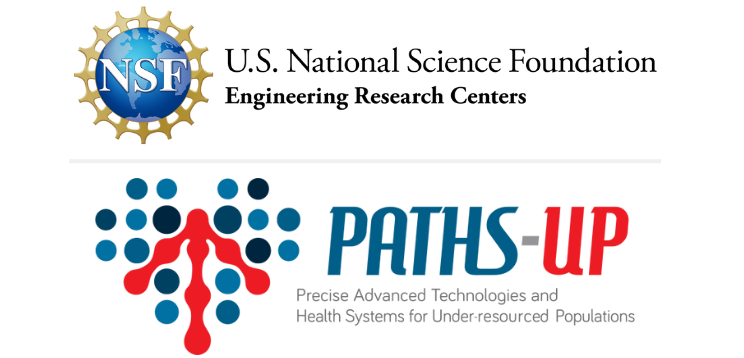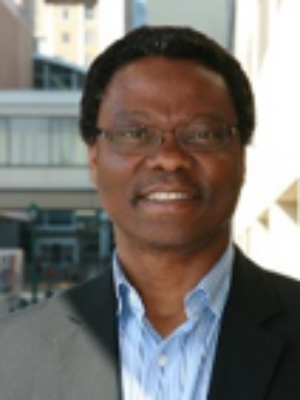
Samuel Achilefu, PhD
Dr. Samuel Achilefu is the inaugural Chair and Professor of the Department of Biomedical Engineering at the University of Texas Southwestern (UTSW) in Dallas. He holds the Lyda Hill Distinguished University Chair and holds additional faculty appointments as a Professor of Radiology and at the Simmons Comprehensive Cancer Center. Dr. Achilefu is a member of the National Academy of Medicine, a Fellow of the National Academy of Inventors, and a member of the National Advisory Council for Biomedical Imaging and Bioengineering at the National Institutes of Health. He is also a Fellow of numerous professional societies, including SPIE, Optica, AIMBE, and AAAS. Prior to joining UTSW in February 2022, he spent over 20 years at Washington University in St. Louis, MO.
His research interests are in the development of molecular imaging probes and therapeutic molecules, new methods, and devices for imaging and treatment of cancer and other biological applications. Dr. Achilefu has published more than 300 scientific papers and he is the inventor of 56 issued US patents. He has received several honors and awards for his innovative work, including the Technical Innovation Award (1995), Extraordinary Performance Award (1998), Achiever Award (2008), Medical Innovator Award (2014), St. Louis Award (2014), Best Global Impact Award (2015), and Outstanding Scientist Award (2015). He has been features in many television programs, including CNN, BBC, PBS, CBS, NBC, Fox, and many other local and international news agencies.
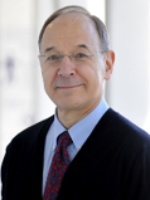
Thomas Baranowski, PhD
Tom Baranowski, PhD, is Professor of Pediatrics and Senior Member of the Behavioral Nutrition and Physical Activity group, within the USDA funded Children’s Nutrition Research Center, Department of Pediatrics, Baylor College of Medicine, Houston, Texas, USA. Tom received his undergraduate degree in Politics from Princeton University (’68) and his masters (’70) and doctorate (’74) in Social Psychology from the University of Kansas. Tom is principal investigator for two currently funded grants including a large outcome evaluation of the diabetes and obesity prevention impact of two video games, “Escape from Diab” and “Nanoswarm: Invasion from Inner Space” funded by NIDDK; and development and evaluation of an all day image processing and review software system for estimating children’s dietary intake and physical activity funded by NCI and USDA. He is co-investigator on another funded project to create computer adapted tests for diet and physical activity parenting. He is founding President of the International Society of Behavioral Nutrition and Physical Activity. He is author or co-author of over 370 peer-reviewed articles, 40 non-peer reviewed articles, 30+ book chapters, two editions of a textbook on methods of evaluation for health promotion programs, and editor of five special issue volumes. He is Editor-in-Chief of both the Games for Health Journal and Childhood Obesity.

Arvind Bhimaraj, MD
Dr. Bhimaraj earned his medical degree from Gandhi Medical College and completed his Masters of Public Health at Kansas University School of Medicine. He completed his residency at Drexel University College of Medicine, cardiology fellowship at John H. Stroger, Jr. Hospital of Cook County and his advanced heart failure and transplant cardiology fellowship at Cleveland Clinic. Dr. Bhimaraj is American Board certified in internal medicine, cardiovascular disease and advanced heart failure and transplantation. In addition, he holds Board Certification for Nuclear Cardiology and Adult Echocardiography. He is a member of the Methodist DeBakey Heart and Vascular Center, Houston Methodist Hospital and is a part of the division of Advanced Heart Failure Cares for the entire spectrum of heart failure patients from new onset disease to advanced heart failure. He is also a member of the J.C. Walter Jr. Transplant Center, Houston Methodist Hospital where he cares for patients with mechanical assist devices and heart transplants. Dr. Bhimaraj is the Director for the Heart Failure Disease Management Program and participates in executive oversight of quality efforts related to Heart Failure at Houston Methodist Hospital. He also co-directs the Heart Failure Translational Research Laboratory leading many research projects.
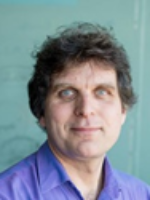
Mark Bradley, PhD
Professor Bradley began his fully independent academic career with the award of a Royal Society University Research Fellowship, which he held at the University of Southampton from 1992 to 2000. During this time, he was awarded a Chair in Combinatorial Chemistry in 1997 at the age of 34. He has led and supported one of the largest research groups in UK chemistry, comprising over 25 members, for more than 25 years, with funding from various research councils and a range of commercial and translational entities.
In 1997, he founded the Combinatorial Centre of Excellence at the University of Southampton and served as its director. He successfully raised funds to build and equip the Centre in Combinatorial Chemistry while establishing a consortium of major pharmaceutical and life science companies to support it.
In 2005, he joined the University of Edinburgh as Professor of Chemical Biology. The Bradley group primarily focuses on applying chemical tools to manipulate, control, and understand specific biological processes and functions, addressing various biological questions, problems, and needs. Their expertise spans fluorescent sensors, smart materials/polymers, and in vivo chemistry. Bradley also directs a 50-member EPSRC Interdisciplinary Research Collaboration that unites clinicians, engineers, biologists, chemists, and optical physicists within a single location, with four compounds currently in first-in-man clinical trials.
In 2023, Bradley accepted the appointment as the Chair and Centre Lead for Therapeutic Innovation at Queen Mary University London, where he is also Professor of High-Throughput Chemical Biology in the School of Chemistry. He holds an ERC advanced grant in the area of novel materials with biological function. He has published over 350 papers, has an H-index of 53, filed more than 20 patents, and has spun out four active companies.
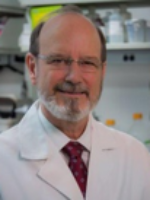
Dale J. Hamilton, MD
Dr. Hamilton’s professional career tract has provided the expertise, leadership, and experience to direct the Center for Bioenergetics at Houston Methodist Research Institute. His education was in cellular molecular biology and medicine, and post-graduate training in medicine and endocrinology, as well as laboratory research. His early professional career combined clinical practice and graduate medical education. The transition to translational research began in 2002 when he formed collaborations with colleagues involving clinical treatment trials and orthotopic human islet transplantation. By 2006 his research focus had narrowed to translational issues related to mitochondrial substrate oxidation and energy transfer in failing organ systems such as the human heart.
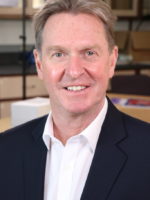
David Kerr MBChB, DM, FRCP, FRCP
David Kerr MBChB, DM, FRCP, FRCP (Edin) is currently Senior Investigator, Diabetes Research and Digital Health Equity, Sutter’s Center for Health Systems. He remains Director of Digital Health Services at the Diabetes Technology Society in Burlingame, CA and Adjunct Professor at the Rice University Department of Electrical and Computer Engineering in Houston, TX.
Dr. Kerr received his medical degree from Aberdeen University in Scotland and spent 2 years as a research fellow at Yale University. Between 1993 and 2014, Dr. Kerr was a clinician in internal medicine/diabetes at the Royal Bournemouth Hospital in the United Kingdom. For this he was awarded a Gold Clinical Excellence award by the NHS. Since 2007 he has been Visiting Professor at Bournemouth University. In 2017 Dr. Kerr launched www.MilFamilias.com and www.LatinoDiabetes.net part of a long-term cohort study aimed at reducing the disproportionate burden of cardio-metabolic disease affecting US Latino families (ClinicalTrials.gov NCT03830840). He is also creator of Farming for Life (NCT03940300), a novel program examining the impact of medical prescriptions of vegetables for adults with or at risk of type 2 diabetes.
Dr. Kerr has published over 350 research papers, commentaries, and editorials. He is Associate Editor of the Journal of Diabetes Science and Technology and co-hosts the Diabetes Technology Reports podcast series. He edited the first two books on digital health and diabetes, entitled Diabetes and Digital Health and Diabetes Digital Health and Telehealth.
In 2017, Dr. Kerr was awarded the prestigious Leadership Award from the Diabetes Technology Society. You can follow Dr.Kerr on Twitter @Godiabetesmd.
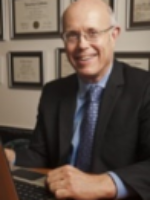
David Klonoff, MD
David C. Klonoff, M.D. is an endocrinologist specializing in diabetes technology. He is a Clinical Professor of Medicine at UCSF and the Medical Director of the Dorothy L. and James E. Frank Diabetes Research Institute of Mills-Peninsula Health Services in San Mateo, California. Dr. Klonoff received an FDA Director’s Special Citation Award in 2010 for outstanding contributions related to diabetes technology. He has been cited as being in the top 1% of endocrinologists nationally by Castle Connolly Medical Ltd. and as best endocrinologist in San Mateo County by Bay Area Consumer Checkbook. In 2012 Dr. Klonoff was elected as a Fellow of the American Institute of Medical and Biological Engineering (AIMBE) and cited as one of the 1000 top bioengineers in the world, as well as among the top 2% of the world’s bioengineers for his engineering work in diabetes technology. He received the 2012 Gold Medal Oration and Distinguished Scientist Award from the Dr. Mohan’s Diabetes Specialities Centre and Madras Diabetes Research Foundation of Chennai, India. Dr. Klonoff is the Founding Editor-in-Chief of Journal of Diabetes Science and Technology. He has authored over 200 publications. Dr. Klonoff founded the Diabetes Technology Meeting, the US and European Clinical Diabetes Technology Meetings, the Tissue Response to Implanted Medical Devices Meeting, and the International Hospital Diabetes Meeting. He was the lead investigator for the first randomized controlled multicenter trial of an outpatient closed loop control product, and published the results in the New England Journal of Medicine. Dr. Klonoff chaired the scientific advisory board for the first FDA-cleared insulin patch pump and participated in developing the first FDA-cleared dedicated diabetes telemedicine system, the two FDA-approved inhaled insulins, and the first three FDA-approved incretin drugs for diabetes. He is currently an advisor to Google for their smart contact lens project. Dr. Klonoff has chaired or served on grant review panels for NIH, CDC, NASA, NSF, US Army, ADA, JDRF, and U of Michigan. Dr. Klonoff is a graduate of UC Berkeley, where he was elected to Phi Beta Kappa in his junior year, and UCSF Medical School, where he was elected to Alpha Omega Alpha in his junior year. His postgraduate training included two years at UCLA Hospital and three years at UCSF Hospitals. He was a member of the NIH Diabetes Interagency Coordinating Committee, whose ten-year research plan was released in 2011. Dr. Klonoff chaired the Endocrine Society Task Force on CGM Clinical Guidelines, the CLSI Subcommittee on CGM Metrics (POCT5), and the Diabetes Technology Society/FDA/ADA/Endocrine Society/AAMI Error Grid Panel. Dr. Klonoff currently chairs the Surveillance of FDA-Cleared Blood Glucose Monitors Program to determine the performance of cleared monitors. He is a member of the NSBRI Board of Scientific Counselors and the NASA Exploration Medical Capabilities Standing Review Panel.

Veena Misra, PhD
Veena Misra is the Director of the National Science Foundation Nanosystems Engineering Research Center on Advanced Self-Powered of Integrated Sensors and Technologies (ASSIST). She is a Distinguished Professor of Electrical and Computer Engineering at North Carolina State University and also an IEEE Fellow. She is also 2018-2020 IEEE Distinguished Seminar Speaker. She received the B.S., M.S., and Ph.D. degrees in electrical engineering from North Carolina State University, Raleigh. After working at the Advanced Products Research and Development Laboratories, Motorola Inc., Austin, TX she joined the faculty of North Carolina State University in 1998. She has authored or coauthored over 150 papers in the areas of state-of-the-art low-power CMOS devices, power devices, alternative high-mobility substrates, nanoscale magnetics, and energy-harvesting. Dr. Misra was the recipient of the 2017 R.J. Reynolds Award for Excellence in Research and Teaching, 2001 National Science Foundation Presidential Early CAREER Award, the 2011 Alcoa Distinguished Engineering Research Award, and 2007 Outstanding Alumni Research Award. She also served as the general chair of the 2012 IEEE International Electron Device Meeting.

Mehmet Toner, PhD
Mehmet Toner is the Helen Andrus Benedict Professor of Biomedical Engineering at the Massachusetts General Hospital (MGH), Harvard Medical School, and Harvard-MIT Division of Health Sciences and Technology. Mehmet received a BS degree from Istanbul Technical University and an MS degree from the Massachusetts Institute of Technology (MIT), both in Mechanical Engineering. Subsequently he completed his PhD degree in Medical Engineering at Harvard-MIT Division of Health Sciences and Technology in 1989. Mehmet is the co-founding Director of the Center for Engineering in Medicine, and BioMicroElectroMechanical Systems Resource Center (BMRC) at the MGH. He is also the Director of Research at the Shriners Hospital for Children Boston. Mehmet’s research interests are broad including thermodynamics in biological systems, low temperature biology, tissue engineering and preservation, micro- and nano-technology, and microfluidics. Mehmet has more than 350 publications, have delivered over 250 keynote or invited presentations, holds over 50 patents, and is a co-founder of multiple biotechnology start-ups. Mehmet is a “Fellow of the American Institute of Medical and Biological Engineering”, “Fellow of the American Society of Mechanical Engineers”, and “Fellow of the Society for Cryobiology.” In 2012, he was given the “Luyet Medal” by the Society for Cryobiology. In 2013, he received the “H.R. Lissner Medal” from the American Society of Mechanical Engineering. He is a member of the “Turksih Academy of Science.” He is also a member of the “National Academy of Inventors” and a member of the “National Academy of Engineering.”
